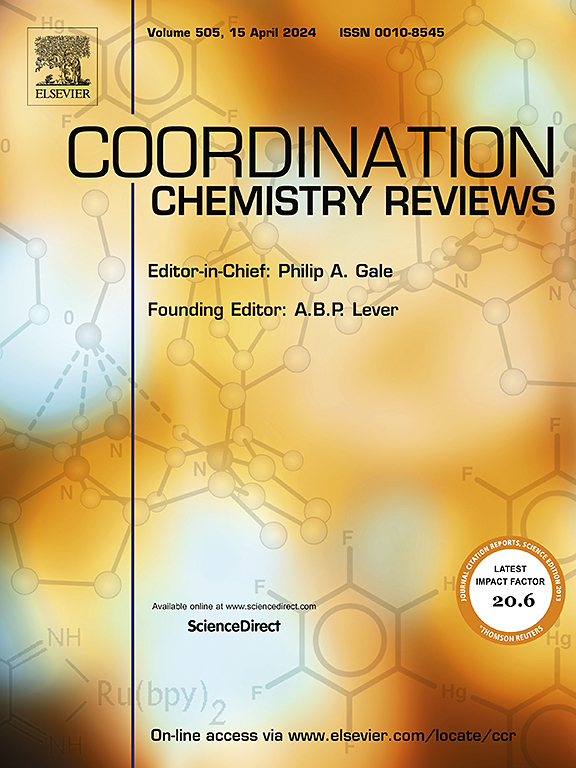Cu-based metal oxide catalysts for NH₃-SCR of NOx: From fundamentals to mechanistic insights
IF 20.3
1区 化学
Q1 CHEMISTRY, INORGANIC & NUCLEAR
引用次数: 0
Abstract
In today's world, emissions from automobile exhaust and industrial chimneys are the major contributors to atmospheric nitrogen oxides (NOx). NOx has detrimental effects on both plants and animals and can cause various diseases. Ammonia (NH3)-based selective catalytic reduction (SCR) is a highly effective method for controlling and mitigating NOx emissions. Cu-based oxides are extensively utilized in NH₃-SCR processes due to their widespread availability, cost-effectiveness, and outstanding redox capabilities, making them a preferred choice among MO catalysts. The presence of copper in both Cu2+ and Cu+ oxidation states offers favorable potential for combination with other transition elements, enhancing catalytic performance. In addition, the synthesis methods use in the SCR process, regeneration, and disposal of Cu-oxide-based catalysts are more cost-effective and environment friendly than those of precious metal oxide SCR catalysts, making Cu-based technology a more sustainable and economical choice. While numerous review papers have explored the role of copper in zeolite-based catalysts for NOx reduction but concise reports focusing on Cu in MO-based catalysts for SCR remain scarce. Therefore, in this work, we aim to review the synthesis methods, reaction mechanisms, structure-activity relationships, economic feasibility, environmental impact assessment and durability of Cu-based oxide catalysts in NH₃-SCR, particularly against water, alkali and alkaline earth metals, SO₂, and other relevant factors.

NH₃-SCR的cu基金属氧化物催化剂:从基本原理到机理见解
当今世界,汽车尾气和工业烟囱的排放是大气中氮氧化物(NOx)的主要来源。氮氧化物对植物和动物都有有害影响,并可引起各种疾病。氨(NH3)基选择性催化还原(SCR)是控制和减少NOx排放的高效方法。cu基氧化物由于其广泛的可用性、成本效益和出色的氧化还原能力,被广泛应用于NH₃-SCR工艺,使其成为MO催化剂的首选。铜在Cu2+和Cu+氧化态的存在为与其他过渡元素结合提供了有利的潜力,提高了催化性能。此外,在SCR过程中使用的铜基催化剂的合成方法、再生和处置比贵金属氧化物SCR催化剂更具成本效益和环境友好性,使铜基技术成为更可持续和经济的选择。虽然有许多综述论文探讨了铜在沸石基催化剂中用于NOx还原的作用,但关于铜在mo基催化剂中用于SCR的简明报道仍然很少。因此,在这项工作中,我们旨在综述NH₃-SCR中铜基氧化物催化剂的合成方法、反应机理、构效关系、经济可行性、环境影响评价和耐久性,特别是对水、碱和碱土金属、二氧化硫等相关因素的影响。
本文章由计算机程序翻译,如有差异,请以英文原文为准。
求助全文
约1分钟内获得全文
求助全文
来源期刊

Coordination Chemistry Reviews
化学-无机化学与核化学
CiteScore
34.30
自引率
5.30%
发文量
457
审稿时长
54 days
期刊介绍:
Coordination Chemistry Reviews offers rapid publication of review articles on current and significant topics in coordination chemistry, encompassing organometallic, supramolecular, theoretical, and bioinorganic chemistry. It also covers catalysis, materials chemistry, and metal-organic frameworks from a coordination chemistry perspective. Reviews summarize recent developments or discuss specific techniques, welcoming contributions from both established and emerging researchers.
The journal releases special issues on timely subjects, including those featuring contributions from specific regions or conferences. Occasional full-length book articles are also featured. Additionally, special volumes cover annual reviews of main group chemistry, transition metal group chemistry, and organometallic chemistry. These comprehensive reviews are vital resources for those engaged in coordination chemistry, further establishing Coordination Chemistry Reviews as a hub for insightful surveys in inorganic and physical inorganic chemistry.
 求助内容:
求助内容: 应助结果提醒方式:
应助结果提醒方式:


